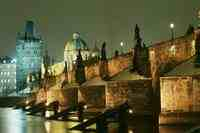Caught in a Czech Funk
Travel Stories: All David Farley wanted from the tourist information office in the tiny town of Nove Hrady was directions to the train station. Then he asked the young clerk a seemingly innocuous question: Was that funk booming from the speakers?
02.21.07 | 5:57 AM ET
 Photo courtesy of Czech Tourism.
Photo courtesy of Czech Tourism.In the 15th century, Papal armies, looking to squash a religious reform movement, marched into Bohemia, the western part of today’s Czech Republic. A couple centuries later, the Austrians, also under the guise of religion, conquered the region. Most recently, my wife and I traipsed through the area on foot. I wasn’t thirsty to spill blood in the name of God—maybe just slurp a couple finely brewed beers in a rural pub. Still, despite my benevolence, Czechs can sometimes be wary of foreigner invaders. But when I asked Richard, an under-whelmed 21-year-old working in an empty tourist information office in tiny Nove Hrady about the booming George Clinton-like funk that was roaring from the speakers, I seemed to become more than the latest invader looking for train information.
“You like this?” Richard said, pulling his eyes away from the train timetable, his eyebrows piqued. “Come,” he said, before I could give him an answer, waving me into a paper-strewn back room where he piled a stack of CDs in front of me.
The music was Czech funk, which Richard, I found out, was crazy about—and my simple inquiry, apparently, was enough for him to think I was crazy about it, too. Seconds later, Richard was playing DJ for me, blasting various Czech funk groups through the boom box, telling me their names, their histories and about the concerts he’d been to.
“Yeah, this sounds good,” I screamed. “But what about the train times to—“
“Wait,” he said, holding up the palm of his hand, as he reached over with his other hand to turn up the volume. “Listen to this.”
My wife and I were in southern Bohemia, in the middle of walking the Prague-Vienna Greenways, a series of old trading routes that pass through desolate villages, ruined castles and formerly forbidden Cold War borderland. We’d just trekked into Nove Hrady and found a room at one of the town’s few points of interest: a baroque monastery that was built by the Austrians to help Catholisize the region after the 17th-century wars of religion; most recently it served as the home of Cold War-era guards who stood on the nearby border waiting to snatch émigrés. As the priest plopped the heavy room key into my hand, he uttered the words “rain” and “tomorrow” in alarming succession, leaving us with three options: trudging 22 miles through a downpour to our next destination, staying in sleepy Nove Hrady another day or deviating from our walking tour by taking the train to the next town, Trebon.
We had to be in Vienna in six days to catch our flight home, which made the decision easy: keep moving by train. To be honest, I was happy to take a day off from the trail. After seven days, my feet were aching, my flesh dotted with fresh mosquito bites and my leg muscles strained. And as unpopular as this may sound, I was tired of nature—I wanted to be back in a city where the “trails” are marked with street signs and not a faded or, in some cases, invisible color marker on a tree; where I had a choice of dining options; where entire villages didn’t rush out to their houses, curious about the strange people trekking down the village’s only street. I loved the idea of this trip, but two weeks of it was rough. The thought of putting my feet up on a train, as it barreled through the same dense coniferous forests we were supposed to trudge through the following day, sounded like paradise. Because the nearest railway station was five miles out of town, we’d have to take a bus to the train, and Richard, my funky friend in the tourist office, was going to tell me how to do it.
I had hoped. Occasional reminders that I still needed the train and bus times now went completely unheard, as Richard stood next to the stereo bobbing his head to the loud music. “This is Monkey Business,” he said. “You like?”
“It reminds me a little of George Clinton,” I said.
“Clin-ton?” said Richard, cocking his head to the side. “He is brother of your last president?”
I laughed, thinking about a time when I interviewed George Clinton, one of the founders of the influential ‘70s funk groups Parliament and Funkadelic. I reminded the wild-haired godfather of funk that the President had once played sax on stage with him. Then I asked if Bill was a “brother” or “brotha.” Clinton, the musician, thought about it for a second and then said Clinton, the president, was definitely a “brotha.”
“He’s his brotha,” I finally blurted out, unsure why.
Richard stared at me blankly, lightly shrugged, and then reached into the CD pile. “This one has hard beat—good for your next hike. Funk is friend of the trekking.”
Several song snippets and a few more attempts to get the train times later, Richard finally acquiesced. With the sun now hovering just above the horizon, Richard walked me to the door. We shook hands and exchanged e-mail addresses.
“You must make promise to buy Czech funk CD when you go home in New York,” he said, as I was walking away. “Then send me e-mail.”
“Okay. I promise,” I said, lying, not entirely sure if I had caught the Czech funk.